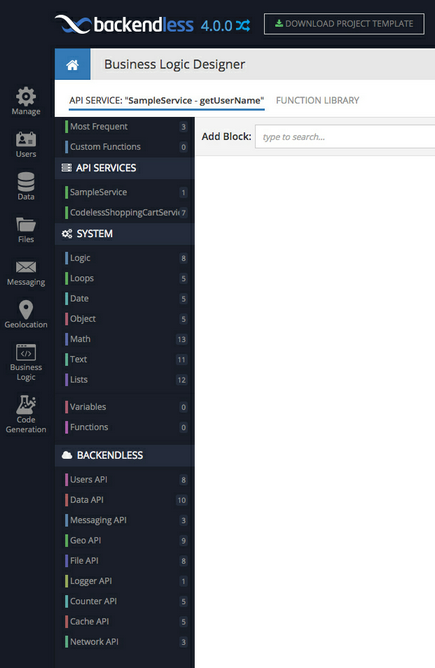Block Reference Overview¶
Blocks is the foundation of the Backendless Codeless system. A single block represents one of the following:
| Represents |
| a logical operation; |
| a programmable loop, which is a construct allowing to repeat one or more operations multiple times; |
| a scalar value (number, boolean, string, date) |
| a collection of values; |
| an object, which is a collection of properties. Each property has a name and a corresponding value. The value can be a scalar, a list or an object; |
| a variable which can be assigned a value; |
| a math operation (addition, subtraction, division, multiplication, power of, square root, etc); |
| a trigonometry function (sine, cosine, tangent, cotangent, etc); |
| a string operation (to upper case, to lower case, substring, etc); |
| a Backendless API call - there is a block for every single API available from Backendless; |
| an API Service method - every single API service available in the app is represented by a block; |
| a custom function; |
Block Categories¶
All available blocks are grouped into categories in Logic Designer:
- Most frequent - a dynamic group of most frequently used blocks. Can be used as a shortcut to find/get most frequently used blocks.
- Custom Functions - contains library functions, which are general purpose custom blocks created for reusability. See Function Library for details.
- API SERVICES - contains a list of API Services deployed into the backend application. Each API Service category contains blocks representing its operations. As an example, the image above shows two API Services - "SampleService" and "CodelessShoppingCartService".
- UI Library - a collection of methods that allow interacting with: web pages, components, events, native methods, event listeners, and component styles.
SYSTEM blocks
| Block |
Usage |
| Logic |
Blocks for executing conditional operations. Such as if/then, comparisons, negation, and the ternary operator. |
| Loops |
Blocks for creating loops. |
| Date |
Blocks for date-related operations. |
| Object |
Blocks for creating new objects, retrieving and setting object's properties. |
| Math |
Math-related operations. |
| Text |
Text-related operations (literal string values, concatenation, upper/lower case, substrings, length, etc. |
| Lists |
Operations on lists and collection of data. |
| Variables |
Blocks for declaring a new variable, assigning a value to a variable, retrieving variable's value. |
| Functions |
Blocks for creating and using inner scope functions. |
BACKENDLESS blocks
| Block |
Usage |
|---|---|
| Users API |
Blocks for using Backendless Users API providing the functionality for registering app users, login, logout, password recovery, etc. |
| Data API |
Blocks for working with the Backendless database. |
| Messaging API |
Blocks for publish/subscribe messaging and push notifications. |
| Geo API |
Geolocation blocks - creating and retrieving geo points, geo searches. |
| File API |
Blocks for working with Backendless Hosting - creating, copying, renaming and deleting files and directories. Retrieving directory listings. |
| Logging API |
Block for logging a message in the Backendless log file. |
| Counter API |
Blocks for working with the server-side (centralized) counters. |
| Cache API |
Blocks for storing and retrieving data from the server-side cache. |
| Network API |
Blocks for creating HTTP/HTTPS requests and retrieving content from a remote resource. |
UI Library blocks
| Block |
Usage |
|---|---|
| App Router |
Blocks for interacting with web pages. |
| Device API |
Blocks for getting information about the device where the app is running. Also there are a few APIs that allow interacting with UI components. |
| Events |
Blocks for event-based operations. |
| Native API |
Blocks for transferring data between the client application and the native wrapper. |
| Component |
Blocks for interacting with components. |
